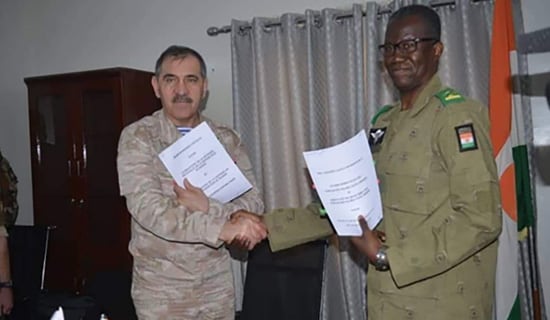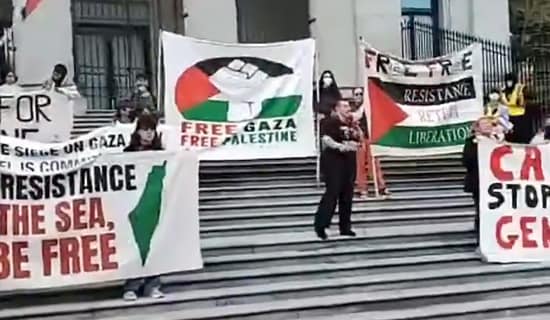In the last 24 hours, Saudi Arabia has sharped its tone towards the U.S., in response to recent statements by U.S. officials, among them President Donald Trump, that Saudi Arabia will be punished if it proves to be responsible for the disappearance of Saudi journalist Jamal Al-Khashoggi on October 2, 2018.[1] A statement by "an official source", released October 14 by the kingdom's official news agency, rejected these warnings and declared that sanctions on Saudi Arabia would be met with "greater action" on its part. The official also noted that "the Kingdom's economy has an influential and vital role in the global economy, and it cannot be affected without impact on the global economy."[2]
The front page headline of the October 15 issue of the Saudi daily 'Okaz said "Don't Test Our Patience" in Arabic and English, and was accompanied by an illustration of a fist.

The same day, Turki Al-Dakhil, director general of the Saudi Al-Arabiya channel, posted an op-ed on the channel's website in which he stated that Saudi Arabia's response to sanctions would be even harsher than the official statement implies. Titled "American Sanctions on Riyadh Will Mean That Washington Is Stabbing Itself," the article warns, citing "sources close to the decision-makers," that Saudi Arabia can take over 30 measures that will bring a "disaster" upon the U.S. economy. Among the measures listed by Al-Dakhil are cutting oil production, which could drive up the price of oil to "$100 or $200 per barrel," or even more; a Saudi economic boycott of the U.S.; suspending the intelligence and counterterrorism cooperation with the West; rapprochement with Iran, Hamas and Hizbullah, and drawing closer to America's rivals Russia and China, to the extent of allowing the establishment of a Russian military base on Saudi soil.
The following are translated excerpts from Al-Dakhil's article:[3]
SUPPORT OUR WORK


Turki Al-Dakhil (image: alarabiya.net)
"I read the statement issued by the Saudi government in response to the U.S. proposals to impose sanctions on Saudi Arabia. Information circulating in Saudi decision-making circles takes a harsher tone than this statement, and speaks of over 30 measures Saudi Arabia will take in response to the imposition of sanctions on Riyadh... These are scenarios that will spell disaster for the U.S. economy more than for the Saudi economy.
"If U.S. sanctions are imposed on Saudi Arabia, we will face an economic catastrophe that will rock the world, for Riyadh is the world capital of oil, and targeting it will harm the production of oil before any other vital commodity. For example, Saudi Arabia will no longer be committed to producing 7.5 million barrels [a day]. If the price of $80 [per barrel] infuriated Trump, then [he should know that] the price will possibly jump to $100 or $200, or even double this price. Moreover, oil may be traded in the Chinese currency instead of in dollars. [It should be noted that] oil is the most important commodity currently traded in dollars. All this will pitch the Middle East and the Islamic world into the arms of Iran, which will become closer to Riyadh than Washington is.
"So much for oil. But Saudi Arabia is not just an oil barrel, it is the leader of the Muslim world thanks to its status and location. [If sanctions are imposed,] the close cooperation and [exchange of] intelligence between the U.S. and the Arab countries, which Western officials themselves admit has helped protect millions of people in the West, will become a thing of the past.
"The imposition of Western sanctions of any kind on Saudi Arabia may push it to [favor] other options, which Trump himself noted several days ago. Russia and China are alternative [countries] that can meet Saudi Arabia's military and other needs. One result of these sanctions may be [the establishment of] a Russian military base in Tabuk in northwestern Saudi Arabia, in the burning region of the four [countries] of Syria, Lebanon, Israel and Iraq. [Another] implication of the sanctions is that Hamas and Hizbullah will turn from enemies into friends. Furthermore, rapprochement with Russia will lead to rapprochement with Iran, and perhaps even to reconciliation with it.
"Quite likely, Saudi Arabia will stop purchasing arms from America. Saudi Arabia is the most important customer of the American companies, for it buys 10% of what the American arms manufacturers sell, and 85% of what the U.S. military sells, which leaves only 5% for the rest of the world. This is in addition to the withdrawal of Saudi investments from the U.S., which come to $800 billion. The U.S. will also be boycotted by the Saudi market, [representing] one of the world's 20 largest economies.
"These are [a few] simple measures among the 30 direct measures that Saudi Arabia will take, without batting an eyelash, if sanctions are imposed on it, as indicated by Saudi sources close to the decision-makers. In practice, by leveling sanctions on Saudi Arabia, the U.S. will be stabbing its own economy to death, while thinking that it is stabbing only Saudi Arabia."
[1] In October 14, 2018 statements to CBS about the Khashoggi affair and Saudi Arabia's possible involvement in it, Trump said: "There's something really terrible and disgusting about that if that were the case. So we're going to have to see. We're going to get to the bottom of it and there will be severe punishment" (cbsnews.com, October 14, 2018).
[2] Al-Watan (Saudi Arabia), October 14, 2018.
[3] Alarabiya.net, October 14, 2018.




